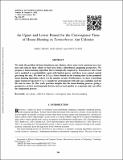An Upper and Lower Bound for the Convergence Time of House-Hunting in Temnothorax Ant Colonies
Author(s)
Zhang, Emily; Zhao, Jiajia; Lynch, Nancy
DownloadPublished version (404.8Kb)
Publisher Policy
Publisher Policy
Article is made available in accordance with the publisher's policy and may be subject to US copyright law. Please refer to the publisher's site for terms of use.
Terms of use
Metadata
Show full item recordAbstract
We study the problem of house-hunting in ant colonies, where ants reach consensus on a new nest and relocate their colony to that nest, from a distributed computing perspective. We propose a house-hunting algorithm that is biologically inspired by Temnothorax ants. Each ant is modeled as a probabilistic agent with limited power, and there is no central control governing the ants. We show an Ω(logn) lower bound on the running time of our proposed house-hunting algorithm, where n is the number of ants. Furthermore, we show a matching upper bound of expected O(logn) rounds for environments with only one candidate nest for the ants to move to. Our work provides insights into the house-hunting process, giving a perspective on how environmental factors such as nest quality or a quorum rule can affect the emigration process.
Date issued
2022Department
Massachusetts Institute of Technology. Department of Electrical Engineering and Computer ScienceJournal
Journal of Computational Biology
Publisher
Mary Ann Liebert Inc
Citation
Zhang, Emily, Zhao, Jiajia and Lynch, Nancy. 2022. "An Upper and Lower Bound for the Convergence Time of House-Hunting in Temnothorax Ant Colonies." Journal of Computational Biology, 29 (4).
Version: Final published version